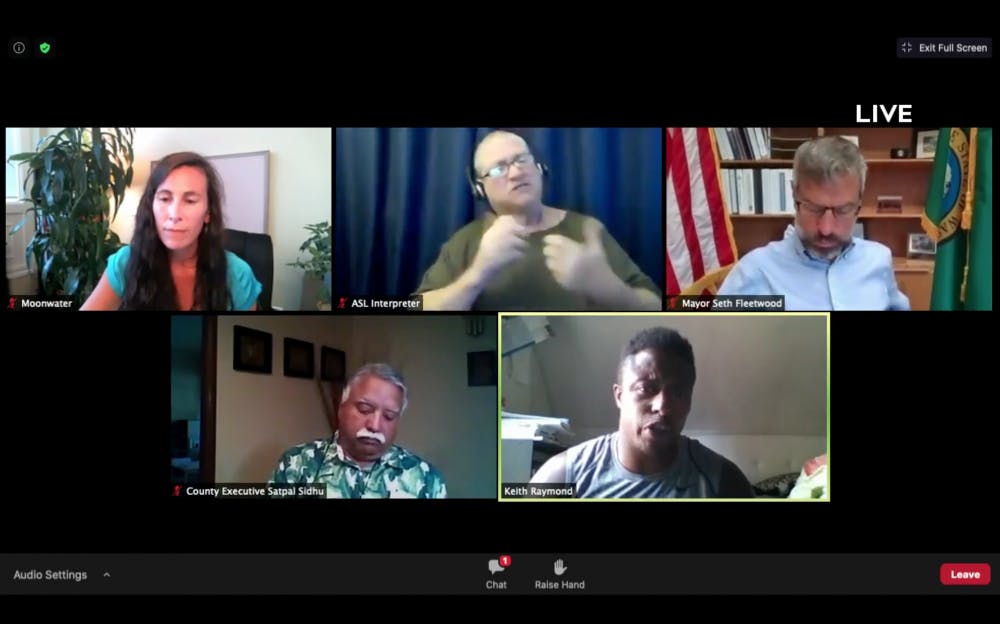Community members share grievances and experiences with Bellingham Police Department

By Taylor Bayly
Bellingham and Whatcom County officials hosted the first meeting in a four part listening series on race and justice over Zoom on July 28. Each listening event lasts two hours and the next event is scheduled for Aug. 10. The events are sponsored by the City of Bellingham, Whatcom County, Western Washington University and the Lummi Nation.
Moonwater, the executive director at the Whatcom Dispute Resolution Center, served as the event moderator. Moonwater noted that while Whatcom County law enforcement agencies also sponsored the event, they will not attend the panel discussion.
“They are not participating formally in the virtual meeting space, by request from and out of respect for community members and partners,” Moonwater said.
Bellingham Mayor Seth Fleetwood, County Executive Satpal Sidhu and Western President Sabah Randhawa attended the event. The meeting included voices from Whatcom County’s Latinx, Black and Indigenous community members.
“The purpose of tonight is to provide the public with opportunities, to share experiences to inform commitments to effective change,” Fleetwood said. “To create a public record of people's ideas and experience and elevate the importance of these issues and to ensure accountability for addressing them.”
One of the event’s first speakers, Keith Raymond, said he’s lived in Bellingham for over 12 years.
“As a Black man living in Bellingham, it has not been easy,” Raymond said. “There are a lot of things that need to be addressed, especially in the poorer communities. Nobody is talking about our kids, and that is really disheartening to me.”
One of the biggest issues with racism that Raymond said he experienced in Bellingham was in the public school system.
“I took my kids out of Bellingham Public Schools because of racism,” Raymond said. “They were instantly treated as the villain instead of being given opportunity. There’s a big problem with racism, and it's not just with police it’s inherently in these communities. Listening is good, but action is better.”
Multiple community members expressed concerns over homelessness, poverty and the possibility of increasing eviction rates due to the COVID-19 pandemic. Speakers stressed that COVID-19 disproportionately affects communities of color.
“Being a homeless advocate, I also speak to the fact that we have an inordinate amount of people of color who are homeless and who are facing homelessness,” said Markis Dee, the vice chair for HomesNow!, a housing advocacy group based in Bellingham. “I am hearing numbers that are scaring me and I know that it's time to take action.”
Community members lobbied Mayor Fleetwood to reduce the Bellingham Police Department’s budget and to reallocate funds into social programs.
Speakers representing communities of color outside of Black communities noted that many of Whatcom County’s residents experience discrimination and hardship.
Rosalinda Guillen serves on the leadership team for Community2Community, a women of color-led coalition that addresses social issues in marginalized communities, specifically for farm workers.
Guillen said she began working as a farm worker at the age of 10 after moving to Washington in 1960. She stressed the importance of the Black Lives Matter movement for other communities of color as well.
“As a farm worker and a Mexican-American growing up in the United States, it has always been really clear to us what the system holds for us,” Guillen said.
Guillen noted that because of Bellingham’s proximity to the Canadian border, Whatcom County houses several federal law enforcement agencies, such as U.S Immigration and Customs Enforcement and the Department of Homeland Security.
“Whatcom County is a militarized county,” Guillen said. “Whatcom County is [also] an agricultural county.”
Guillen said Whatcom heavily relies upon its farm workers and Latinx communities to support the economy.
“[The Latinx community] is suffering disproportionately from the effects of COVID-19. We are asking you to stop allowing law enforcement to be a part of governance,” Guillen said. “Create instead the type of community policing that is at the service of the community, and not the service of the government, and not as a part of governance.”
There are three more discussion panels scheduled until the end of August. The next event will be held over Zoom on Aug. 10 from 6 p.m. to 8 p.m. Attendees wishing to speak at the event can register here. Those wishing to watch the event without commenting can watch the panel live on the City of Bellingham’s YouTube channel.





